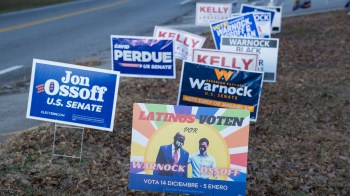Business groups change up their political giving
After last month’s government shutdown and brinkmanship regarding raising the nation’s borrowing limit, the business community is making its dissatisfaction with how business gets done in Washington clear through a new pattern of political giving.
Business groups are getting involved earlier in races, and they’re supporting more centrist candidates.
Greg Casey runs one of the oldest political action committees in Washington, the Business Industry PAC, or BIPAC, which has been around since 1963. According to Casey, there is a lesson to be learned here: businesses need to evaluate candidates more carefully.
“If they come in and they just want to blow the system up, rather than make the system work, then you need to probably support someone else,” he says.
Casey is telling BIPAC’s members they should support candidates who want to make Washington less dysfunctional.
Sheila Krumholz, the executive director of the Center for Responsive Politics, says business groups are giving money before the general election to candidates who are challenging incumbents. In the Washington way of speaking, to challenge someone is “to primary” him.
“Business groups are now saying they want to primary Tea Party candidates instead of being primaries by the Tea Party,” Krumholz says.
We saw this last week, in Alabama. The U.S. Chamber of Commerce backed the more moderate of two Republican candidates in a runoff election, and that more moderate candidate won.
“So already, they seem to be putting their money where their mouth is,” Krumholz says. The Chamber of Commerce spent about $200,000 on that campaign.
The business community’s discontent is giving rise to new PACs and super PACs. Steve LaTourette, a former congressman, started one called Defending Main Street.
“What we’re going to do as we go into 2014, our little group is going to support center-right candidates who are interested in governing,” he explains.
Defending Main Street held a fundraiser last week on Wall Street. LaTourette hopes to raise at least $8 million to back more business-friendly candidates.
Greg Casey, the CEO of BIPAC, says the Tea Party movement’s success should be a wake-up call to business.
“They have allowed themselves to be small, and increasingly smaller, players or checkbooks to one candidate or another,” he says.
There’s a lot happening in the world. Through it all, Marketplace is here for you.
You rely on Marketplace to break down the world’s events and tell you how it affects you in a fact-based, approachable way. We rely on your financial support to keep making that possible.
Your donation today powers the independent journalism that you rely on. For just $5/month, you can help sustain Marketplace so we can keep reporting on the things that matter to you.


















